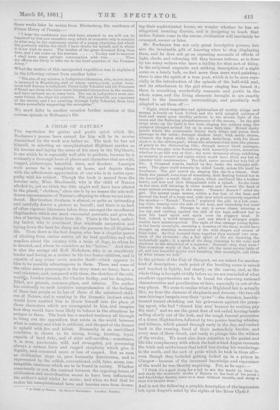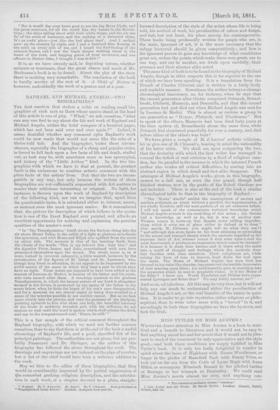A CHILD OF NATURE.*
THE reputation for genius and poetic spirit which Mr. Buchanan's poems have earned for him will be iu nowise diminished by the work now before us. The task he has set himself, in selecting an unsophisticated Highland maiden as his heroine and laying the scene of his story in the Higtilands, is one which he is especially well able to perform, because ho is evidently a thorough lover of places and characters that are wild, rugged, picturesque, beautiful, stern, and desolate. Amongst such scenes ho is completely at home, and depicts them with the affectionate appreciation of one who is in entire sym- pathy with his subject. Though the book is named from the heroine only, Mina Macdonald, who is the child of Nature alluded to, yet we think the title might well have been altered to the plural, " children," since she is by no means the sole well- drawn representative of Nature's offspring to whom we are intro- duced. Her brother, Graham, is almost, or quite as interesting and carefully drawn a picture as herself ; and there is no lack of other vigorous likenesses taken from amongst the uncultured Highlanders which are most successful portraits, and give the idea of having been drawn from life. There is the hard, unfeel- ing factor, who is convinced that wholesale emigration and laying down the land for sheep are the panacea for all Highland ills. Then there is the fool Angus, who has a singular power of eliciting from canine nature all its best qualities, and who wanders about the country with a train of dogs, to whom he is devoted, and whom he considers as his " bairns." And there is also the savage old Koll Nicholson, who is as sensitively tender and loving as a mother to his two foster-children, and is capable of any crime—even murder itself—which appears to him to be possibly advantageous to them. These and some of the other minor personages iu the story must, we fancy, have a real existence; and, corn pared with them, the sketches of the cold, worldly, London baronet, Sir Charles Sedley, and his daughter, Ethel, are prosaic, common-place, and inferior. The author has evidently no such intuitive comprehension of the feelings of these last people as be has of those of the untutored child- ren of Nature, and is wanting in the dramatic instinct which would have enabled him to throw himself into the place of those characters which are uncongenial to him, and imagine how they would have been likely to behave in the situations he assigns to them. The book has a marked tendency all through to bring out the opposition that exists in the world between what is natural and what is artificial, and the part of the former is upheld with fire and talent. Humanity in an uncivilised condition is shown to be strong, loving, trusting, loyal, capable of hard duty, and of utter self-sacrifices-sometimes, it is true, passionate, wild, and revengeful, yet possessing always a certain force and rugged simplicity which give it dignity, and command more or less of respect. But as soon as civilisation steps in, poor humanity deteriorates, and is represented by the selfish, conventional, cold, false, mean, con- temptible creatures which are to be found in society. Whether consciously or not, the contrast between the opposing forces of civilisation and unoivilisation seems to have been influencing the author's mind whilst he wrote; and when we find that ho
makes his unsophisticated hero and heroine save from drown- _
A Child of Rotors. IIy Robert Buchanan. London: Bentloy.
ing their sophisticated lovers, we wonder whether he has ant allegorical meaning therein, and is designing to teach that unless Nature come to the rescue, civilisation will inevitably be- swamped, sooner or later.
Mr. Buchanan has not only great descriptive powers, but also the invaluable gift of knowing when to stop displaying them, and he does not go on repeating accounts of effects of light, shade, and colouring till they become tedious, as is done- by too many writers who have a facility for that sort of thing. In the subjoined exquisite and striking description of a night scene on a lonely loch, we find more than mere word-painting ;. there is also the spirit of a true poet, which is to be seen espe- cially in the introduction of the episode of the half-wild seal,. and its attachment to the girl whose singing has tamed it ;. there is something wonderfully romantic and poetic in the whole scene, and the living elements brought iu arc exactly fitted to the inanimate surroundings, and peculiarly well adapted to set them off :-
" Night, which beautifies and spiritualises all earthly timings and scenes, is lovely on Loch Uribol, and the wild mingled outlines of land mind water grow terribly pathetic in the silveru light of the- moon and the fluttering phosphorescence of the aurora. As the girl crept alone up the fjord in her boat, singing her solitary song, the' prospect changed around her as in some fairy-tale. Round dusky points whore the cormorants flutter their wings and preen their
plumage in the /neon ; through shallow bays, with sandy shores,. whereon the heron stalks like a ghost, knee-deep, with his black shadow in the silverapool ; where the mirrored stars were like gleams of pearls in the shimmering tido ; through narrow black passages,. whore the sea-pigs were floundering with unearthly noises, uneertlin
whether to go this way or that ; she wont dreaming along, exhibiting no surprise at sounds and sights which would have filled any bat an islander with consternation. The dark scene around her was full of life. A thousand sounds, hushed by day, broke the midnight still- ness. The place could scarcely be called lonely, unless life itself be loneliness. The girl rowed on, singing like one in a dream. Sud- denly she paused, conscious of something dark floating behind her in the moonlight—a small black object, which oscillated like a leather- bottle, and now and then disappeared with a splash. As she leant on her oars, still intoning, it came nearer, and showed the head of some animal swimming in the water. 'Earach Earaeh !' cried the girl. The animal come nearer, within a few feet of the boat, and showed the head of a large seal, with eyes which attentively regarded the speaker.—' Earach ! Earach !' repeated the girl, in a low, coax- ing voice, loaning over the side of the boat, and stretching her hand' towards the animal. Strange to say, it swam closer, uttering a. low cry, and rubbing against the side of the boat, suffered her to- pass her hand again and again over its slippery head. It was, indeed, a weird situation, and one which a stranger might readily have misinterpreted. The sight of that strange young figure in the lonely moonlight, caressing a monster of the deep, would have brought up startling memories of the wild shapes nod scenes of fairytales. As they hovered there together they scorned two crea- tures of the elements : she, a fair spirit of the air, haunting the melancholy night ; it, a spirit of the deep, listening to the voice and obedient to the ministries of a superior. Seemed—nay, they were ? This wondrous world of fact is, after all, the most mystic. fable of all, and two beautful spirits were haunting that moonlight, call them by what names we will."
Iu the picture of the Fair of Storport, we see talent for another kind of. description ; each point of the bustling scene is seized: and touched in lightly, but clearly, on the canvas, and, as the- whole thing is brought vividly before us, we are reminded of what excellent opportunities are to be found for observing national
characteristics and peculiarities at fairs, especially in out-of-the way places. We seem to realise what a Highland fair is actually like; we hear the clamour of shepherds and drovers—the two old men driving a bargain over their "yews "—the drunken, harshly-• treated tenant shrieking out his grievances against the grasp- ing agent, who bad " cleared him awn' because he couldna pay' tho rent ;" and we see the great fleet of red-sailed herring-boats. sailing slowly out of the loch, and the rough funeral procession of a dozen Highlanders, followed by two ponies bearing whiskey and tobacco, which passed through early in the day, and rushed back in the evening, freed of their melancholy burden, and every man of them drunk, and ready to plunge into the wildest. of the revelry. We must also draw attention to the quaint and life-like complacency with which the half-witted Angus recounts. the trials and misfortunes that befell him during his wanderings. in the south, and the sort of pride which he took in them all— even though they included getting locked up in a prison io Glasgow—because of the increased knowledge and experience- of the world ho was thereby acquiring. For, as he says :— " I think it's a goot thing for a lad to see the world lie lives in,. and study the wonderfu' works o' Nature to the best of his p000r ;. and knowledge doesna come to a mail witboot trouble, and mony time it's boocht dear."
And is not the following a graphic description of the impression, left upon Angus's mind by the sights of the River Clyde P
"But it would doe your heart goot to see the big River Clyde, and the great steamers, for all the world like the beasts in the Revela- tions ; the ships sailing about with their white wings, and the air see IV of the noise of hummers, and the making of a thousand ships. It's an owfu' place—jest like the bad place heel'. And I walked awa' up the country by night, and I saw a hundred fires flaming in the mirk on every side of me, and I heard the foof-foofing of the crimson flames, and I saw the black shapes walking about in the heart of the reek, and begging grace of your reverence, and nae offence to Doctor John, I thought I was in hell 1" It is, as we have already said, in depicting nature, whether animate or inanimate, that the great charm and merit of Mr. Buchanan's book is to be found. About the plot of the story -there is nothing very remarkable. The conclusion of the book is hardly worthy of the rest of it. A Child of Nature is however, undoubtedly the work of a genius and of a poet.



































 Previous page
Previous page